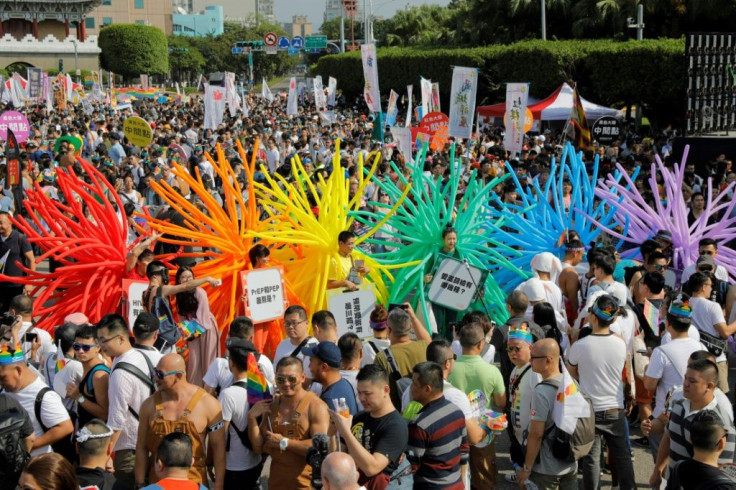Taiwan Gay Couples Urge Foreign Marriage Rights After Tsai Win

Rights groups and gay couples called on Taiwan's President Tsai Ing-wen Tuesday to cement the island's reputation as a bastion of LGBT rights by recognising international same-sex marriages following her landslide re-election victory.
Taiwan is at the vanguard of the burgeoning gay rights movement in Asia and became the first place in the region to legalise gay marriages last year after a bruising political fight.
Nearly 3,000 couples have since wed as of December but rights advocates say the law still contains restrictions not faced by heterosexual couples.
Same-sex couples can only wed foreigners from countries where gay marriage is also recognised and can only adopt their partners' biological children.
"I hope President Tsai can see the difficulties international couples face," said Lai Kai-li, whose partner is from conservative Malaysia.
"We feel like our futures are in limbo right now and we can't really make any plans," she added.
A 26-year-old Hong Konger -- who asked to be identified only as Yan -- said she longed for Tsai's Democratic Progressive Party to push further on gay rights.
"Hong Kong doesn't have freedom and human rights now and I think it would never recognise same-sex marriage," she told reporters.
Hong Kong's judges have repeatedly ruled in favour of granting more rights to same sex couples but the city's conservative pro-Beijing leadership has resisted legislative changes.
"President Tsai said she has achieved marriage quality but we'd like to tell her it's not completed yet and there are still some things to be done," said Chien Chih-chieh, secretary general of Taiwan Alliance to Promote Civil Partnership Rights.
According to the alliance, more than 200 international same-sex couples are waiting for their unions to be recognised in Taiwan.
Tsai was handed a second term earlier this month following a landslide victory that won her a significant mandate.
Her party also retained a comfortable majority in the island's single house legislature.
Her presidency is wildly popular among Taiwan's youth who are much more likely to back progressive issues than older voters.
But the issue of same sex marriage proved deeply divisive -- even though Taiwan's top court had ordered politicians to provide marriage equality for gay couples.
It is not clear whether Tsai and her party would want to risk another potentially fraught culture clash.
Nonetheless over the last decade Taiwan has become increasingly progressive on gay rights with Taipei home to a thriving LGBT community and the region's largest pride marches.
Last year a record 200,000 people attended the march in Taipei to celebrate after the legalisation of same-sex marriages.
© Copyright AFP 2024. All rights reserved.




















